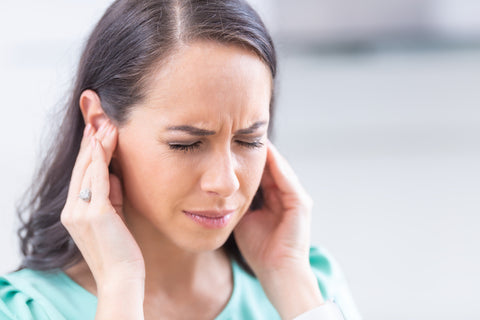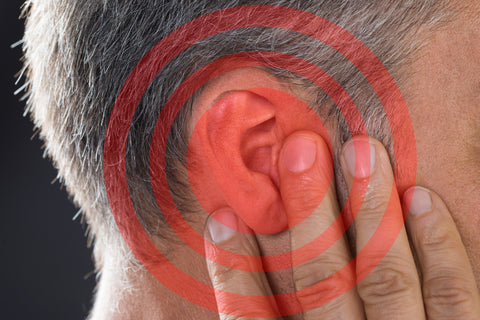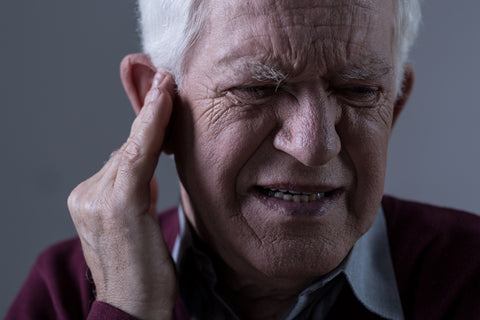Hearing loss and tinnitus are both common abnormal hearing manifestations. Tinnitus can cause headaches, insomnia, and other troubles, making people anxious, depressed, and different bad moods; hearing loss affects verbal communication, making people have communication difficulties and slow reaction time.

The relationship between tinnitus and hearing loss
It is now recognized that hearing loss is the most common initiating factor for tinnitus. When hearing loss occurs (inadequate auditory input), all acoustic system levels begin to compensate for the hearing loss.
Research confirms that the most active auditory compensation occurs at the thalamus level, where tinnitus signals are generated. These signals are transmitted to the brain's hearing centers to produce "tinnitus." Although the tinnitus signal is an aberrant sound signal generated by the auditory system's spontaneous excitation, it can also partially compensate for the lack of sound input.
Clinical phenomena show that the relationship between tinnitus and hearing loss is intricate. People with the same degree of hearing loss do not necessarily have the same tinnitus. People with the same degree of tinnitus may have different degrees of hearing loss.
1. Acute hearing loss and tinnitus
The hearing loss most clearly associated with tinnitus is acute hearing loss, such as sudden deafness.

Sudden deafness causes the auditory system to immediately activate auditory compensatory mechanisms that allow all-acoustic system levels to compensate for the inadequate input of sound signals. The process of compensation produces a tinnitus signal, resulting in tinnitus symptoms.
When sudden deafness first occurs, this less intense tinnitus signal can both compensate for part of the hearing loss and serve as a specific warning reminder, prompting a certain amount of anxiety and tension in the patient and increasing sympathetic nerve activity, thus improving the efficiency of auditory compensation without causing severe distress to the patient.
As the hearing situation stabilizes, the organism gradually adapts to hearing loss. Auditory compensation begins to diminish, and tinnitus is relieved.
Some patients whose hearing is not fully restored after sudden deafness may experience a mild degree of tinnitus, which is a "scar" that occurs after damage to the auditory system and does not usually affect life.
2. Fluctuating hearing loss and tinnitus
Recurrent fluctuating hearing loss, such as the tinnitus produced by Meniere's disease and otosclerosis, can be understood as a recurrent acute hearing loss process.

With each repetition, the auditory system initiates a compensatory mechanism for acute hearing loss. All auditory centers' levels spontaneously excite to produce tinnitus signals and transmit them to the brain to compensate for the lack of auditory input caused by the hearing loss. The tinnitus appears and then slowly clears.
Therefore, fluctuating hearing loss with tinnitus should be treated from the etiology and targeted hearing loss.
Tinnitus that takes longer to recover after hearing stabilization can be given a certain amount of proper compensation. The compensated sound can effectively reduce a load of auditory settlements so that tinnitus symptoms can be gradually relieved.
3. Age-related deafness and tinnitus
Some patients with senile deafness are also often accompanied by tinnitus.
Age-related tinnitus tends to be chronic. Hearing loss gradually worsens with age. Tinnitus signals slowly accumulate, and chronic tinnitus that is progressively worse and difficult to eliminate may occur.

There is no clear and effective drug or surgical treatment for age-related deafness. In this case, reducing the load of auditory compensation, compensation of auditory input, and allowing the ears to receive more external sound stimulation are effective means to improve tinnitus symptoms. Simultaneously, we should also actively improve the factors that cause the decline of the auditory system, such as staying away from the noise, abstaining from smoking and alcohol, taking regular rest, and paying attention to diet.
Each person's auditory system is specific, and different types and degrees of hearing loss have other effects on tinnitus. When hearing loss and tinnitus appear, it is essential to seek help from a hospital or a regular hearing center to actively cope with them and reduce the distress caused by hearing loss and tinnitus.


